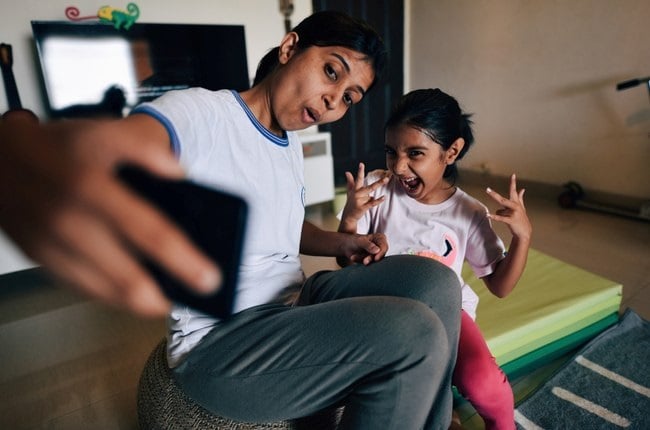
- Children may find themselves victims of what is arguably the greatest mass privacy violation of all time: 'sharenting'.
- It can be harmful in many ways, including identity theft, mental health issues and child abduction.
- However, social media has its positives, too, and there are ways parents can use it responsibly.
Imagine that your entire life has been documented on social media.
A dual-line on a pregnancy test stick, signalling your existence. Your very first ultrasound scan, when you were little more than a hazy in utero blob. The day you were born, your parents proudly displaying their bundle of joy to the camera. You, as a toddler, gleefully splashing around in the bathtub. Your first day of school.
Every moment is painstakingly captured and shared online with loving friends, family members, and strangers who may have possible nefarious intentions. Advertisers. Tracking software. All without your consent.
READ MORE | Mom shares 15-year-old son’s positive drug test and encourages testing, psychologist weighs in
Liezel Gordon, client engagement team lead at Metropolitan GetUp and mother of three, says that this is not science fiction but a reality faced by today’s children, who may find themselves victims of what is arguably the greatest mass privacy violation of all time: sharenting.
Sharenting can be harmful
‘Sharenting’ – a fusion of ‘parenting’ and ‘sharing’ – is defined as the habitual use of social media to share news or images of one’s children, with the rising prevalence of this phenomenon earning it an official place in the dictionary. It can harm a child in many ways, leading to identity theft, privacy and data protection rights violations, mental health issues and even child abduction or trafficking.
Says Gordon:
Indeed, around 80% of children living in developed Western countries will have a digital footprint before they are two years old, according to a 2021 report.
The paper highlights that today’s children are the first generation to be born into a digital age, while their parents are the first to rear ‘digital children’. It adds that the formation of their digital identity is largely driven by the actions of their family throughout their childhood.
READ MORE | Are the kids okay? How the pandemic spiked mental health issues in children, and how to help them
“As parents we are responsible for protecting our children. We should respect their privacy and act in their best interests whilst recognising that they are independent human beings. That said, how do we balance our children’s right to privacy with our right to freedom of expression?” asks Gordon.
Parent's right to share trump child's right to privacy?
The United Nations Convention on the Rights of the Child (UNCRC) states that "no child shall be subjected to arbitrary or unlawful interference with his or her privacy, family, home or correspondence."
Children's right to privacy is also safeguarded in article 16 of the Convention on the Rights of the Child (CRC) and article 10 of the African Charter on the Rights and Welfare of the Child (African Children's Charter).
Yet, in many cases, a parent’s desire to share details about their child online seems to trump their child’s right to privacy. The authors of a 2021 paper highlights: “These parents act as both gatekeepers of their children's personal information and as narrators of their children's personal stories. This dual role of parents in their children's online identity gives children little protection as their online identity evolves.”
And as these digital children grow up, we’ve yet to see the full repercussions of sharenting, warns Gordon.
Social media has its positives, too
Gordon highlights that social media has many positives, too: “We live in an age where technology is part of life – children need to learn how to work with tech and social media to become competent digital citizens.”
Online platforms facilitate group learning, while remote learning and peer-to-peer learning broaden the sources from which children learn.
READ MORE | Children's mental health and the digital world: how to get the balance right
“It can also provide a platform for children to express themselves – think of the creative content we’re seeing on TikTok, for example. It is also a great way to slowly introduce accountability – but the keyword here is slowly,” says Gordon.
She shares several ways that parents can use social media responsibly while empowering their children to enter the world as confident digital citizens.
1. Be aware of who can access the information you share online
Tighten your privacy settings to limit your profiles to only people you know and trust, and never publish content of a sensitive nature. Even if later deleted, the digital footprint remains.
“Never publish personal information such as where your child goes to school, their schedule or your home address. Don’t share images of them in compromising positions, no matter how innocent – for example, a picture of a toddler splashing around naked in a swimming pool or bathtub. You never know what predators may be lurking online,” says Gordon.
2. Instill digital literacy from an early age
To be able to teach your child how to be a responsible and empowered digital citizen, you need to be one yourself, says Gordon. This means educating yourself and your children on social media’s inherent dangers, what not to share online, and how to use social media as a force for good.
“Teach them how to exercise their online rights in a manner that protects their interests and those of others,” she advises.
3. Establish boundaries
Once again, you set the example here, says Gordon. “Be present: don’t continuously scroll and react to social media when your child needs interpersonal contact. Establish rules such as no phones at the dinner table or no screen time between certain hours of the day.”




 Publications
Publications
 Partners
Partners











